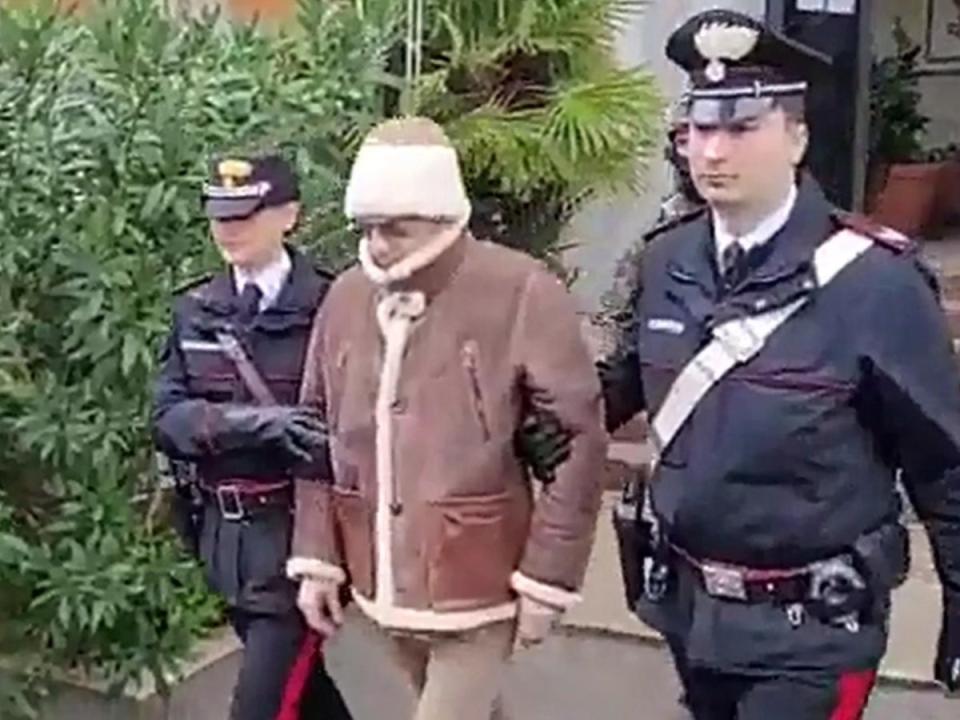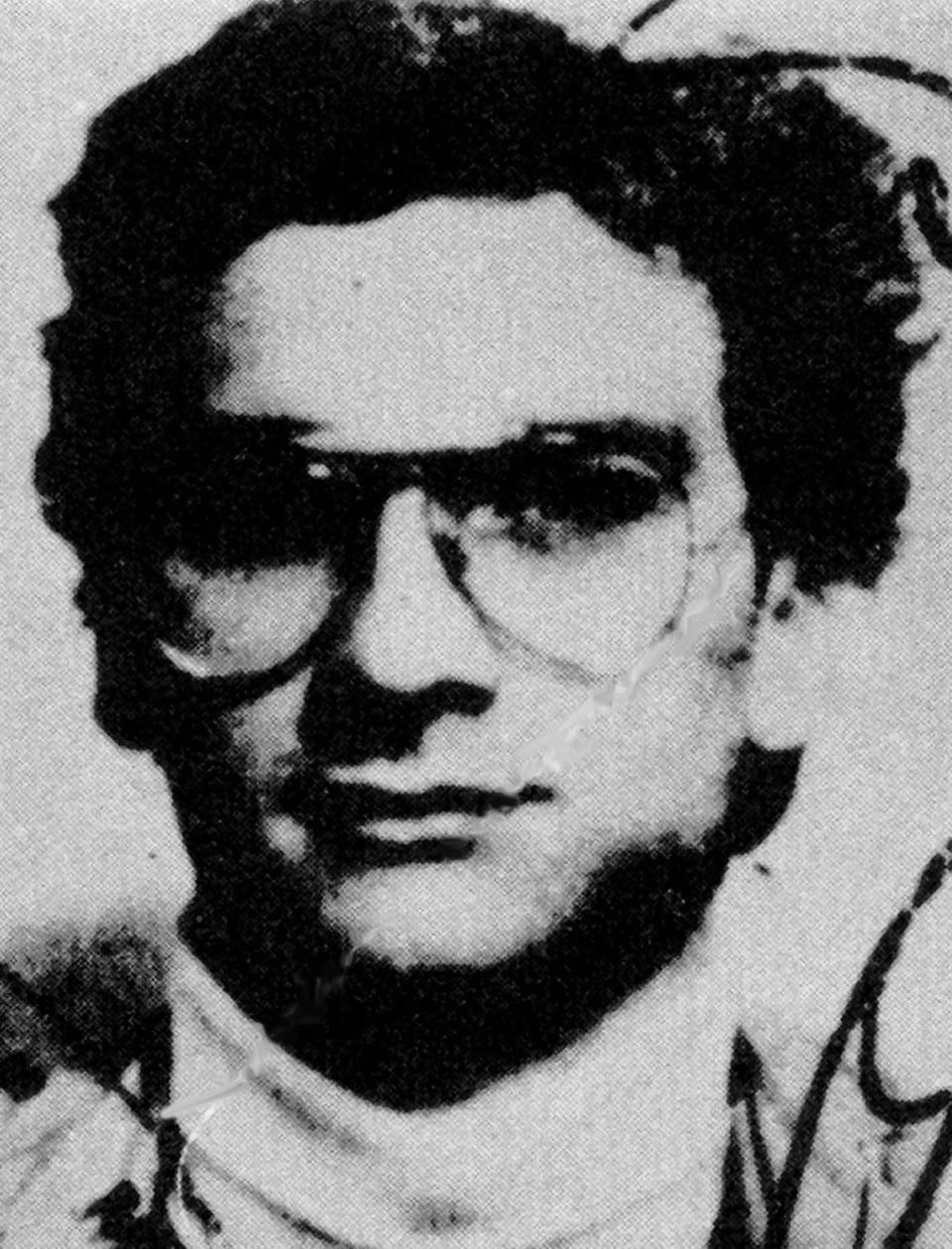Matteo Messina Denaro: The last ‘godfather’ of the Cosa Nostra arrested after 30 years on the run
- Oops!Something went wrong.Please try again later.
The capture of Italy's most wanted mafia boss, Matteo Messina Denaro, after almost three decades on the run was hailed as "a great victory for the state" by the country's prime minister, Giorgia Meloni. Locals clapped and shook hands with police as Messina Denaro was led away from a private clinic in Palermo that proved his final stop as a free man.
Known as "Diabolik" – a nickname taken from a comic book series based around an uncatchable thief – and "'U Siccu" [skinny one], Messina Denaro is thought by many to be the last "secret-keeper" of the Cosa Nostra, someone who holds all the information around some of the Sicilian Mafia's most heinous crimes.
There is no doubt that Messina Denaro – now 60 – is the last of the three "nobility" of the clan. His arrest comes almost 30 years to the day since that of another boss, Salvatore “Toto” Riina, in a Palermo apartment after 23 years on the run (Riina would die in 2017). Meanwhile, Bernardo Provenzano set the record for the longest time eluding police, having been captured in a farmhouse near Corleone, Sicily, in 2006 after 38 years as a fugitive (he would die in 2016).
Criminology professor Anna Sergi, of the University of Essex, told the BBC that Messina Denaro's arrest was "symbolic not just because he was the boss of Cosa Nostra, but because he represents the last fugitive the Italian state really wanted to get its hands on. That's why we saw people clap in Palermo and why the state is triumphant - because the news feels like closure."
Messina Denaro went into hiding in 1993. In August 2021, the Italian public TV broadcaster Rai released a recording dating back to March of that year in which the voice of Messina Denaro was identified for the first time during a trial in which he was called to testify. He disappeared a few weeks later. Prosecutors have said he was involved in the Sicilian mafia's bombing campaign in the early 1990s, which killed magistrates and bystanders in Sicily, Rome and Florence. He has been tried in absentia and convicted of dozens of murders, and now faces multiple life sentences.
One of those terms is for what what prosecutors have laid out as his role in the 1992 murders of anti-mafia prosecutors Giovanni Falcone and Paolo Borsellino, which shocked Italy and led to a fierce crackdown on the Cosa Nostra. Maria Falcone, sister of the murdered prosecutor said of Messina Denaro's arrest: "It proves that mafiosi, despite their delusions of omnipotence, are ultimately doomed to defeat in the conflict with the democratic state".

In 1993, Messina Denaro is also said to have helped organise the kidnapping of a 11-year-old boy, Giuseppe Di Matteo, in an attempt to dissuade his father from giving evidence against the mafia, according to prosecutors. The boy was held in captivity for two years before he was strangled and his body dissolved in acid.
Messina Denaro is said to see himself as a philosopher, folk hero and serial seducer. He once infamously claimed that "I filled a cemetery all by myself". He was born in Castelvetrano, Sicily, in 1962. His father was a powerful Cosa Nostra boss, and Messina Denaro is said to have thrived in the business, with prosecutors saying that he built an empire in the waste, wind energy and retail sectors, potentially worth billions of euros. Extortion and intimidation were also said to be part of his repertoire. "Messina Denaro is not living in the country eating chicory. His is a golden lifestyle," Italian state prosecutor Teresa Principato told The Guardian in 2014. "He is a greedy, ruthless, money-maker who will get involved in any business that makes a profit – and his methods work."
Before he went into hiding, Messina Denaro was known for driving expensive cars and his taste for wearing finely tailored suits and Rolex watches. He is said to have become increasingly more isolated over the years, as prosecutors like Ms Principato relentlessly went after businesses they believe were connected to the crime boss and more than 100 people believed to be his associates were arrested. They included cousins, nephews and his sister. This "scorched earth" policy was aimed at closing the net around Messina Denaro.

However, the search for him was complicated by a lack of recent photographs. Police resorted to digitally aging images from the 1980s and 1990s and adding in details from information – although some mafia turncoats suggested that Messina Denaro had undergone facial surgery to change his appearance.
There have been numerous cases of mistaken identity over the years, including a Formula 1 fan from Liverpool being arrested at gunpoint in the Netherlands in 2021. The man, named as Mark L, had been eating at a restaurant with his son when police burst in, carrying a European Arrest Warrant issued by the Italian authorities. His lawyer Leon van Kleef said it was "like a bad movie, a nightmare that my client has found himself in" and that Mark had "anger and disbelief and laughter because it is ludicrous".
Messina Denaro's arrest did not live up to the tales that had built up around him. He was taken away at about 9.35am from the private clinic in Palermo. According to police sources, Messina Denaro had sought to escape from the building when he saw police arriving – but once surrounded he did not put up resistance. Italian media reported that he had been periodically receiving treatment for about a year – including cancer treatment – under the false name of “Andrea Bonafede”.
Italian authorities will now seek to extract any revelation of Cosa Nostra's activities they can from Messina Denaro. Police said in September 2022 that he was still able to issue commands relating to the way the mafia was run in the area around the western Sicilian city of Trapani, his regional stronghold, despite his long disappearance.
Although Cosa Nostra is not the group it once was. While it retains control of its Sicilian territory and a capacity to infiltrate the broader economy, it has been supplanted by groups such as the Calabrian 'Ndrangheta in the drugs trade.

